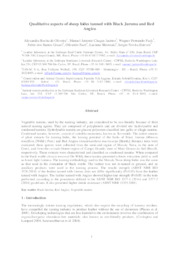Qualitative aspects of sheep hides tanned with Black Jurema and Red Angico.
Qualitative aspects of sheep hides tanned with Black Jurema and Red Angico.
Author(s): OLIVEIRA, A. R. de; JACINTO, M. A. C.; FUCK, W. F.; GRASEL, F. dos S.; FACÓ, O.; SHIOTSUKI, L.; ESTEVES, S. N.
Summary: Vegetable tannins, used by the tanning industry, are considered to be eco-friendly because of their natural tanning agents. They are composed of polyphenols and are divided into hydrolysable and condensed tannins. Hydrolysable tannins are glucose polyesters classified into gallic or ellagic tannins. Condensed tannins, however, consist of catechin monomers, known as flavonoids. The native sources of plant extracts for tanning hides, the tanning potential of the barks of Black Jurema (Mimosa tenuiflora [Willd.] Poir.) and Red Angico (Anadenanthera macrocarpa [Benth.] Brenan.) trees were evaluated; these species were collected from the semi-arid region of Morada Nova, in the state of Ceará, and from the cerrado biome region of Campo Grande, state of Mato Grosso do Sul (Brazil), respectively. These extracts were characterized and classified as condensed tannins. When compared to the black wattle (Acacia mearnsii De Wild), these tannins presented a lower extraction yield as well as lower light fastness. The tanning methodology used in the Morada Nova sheep hides was the same as that used in the evaluation of black wattle. The leather was not re-tanned or greased, and no auxiliary products were used in the tanning process. The tensile strength (ABNT NBR ISO 3376:2014) of the leather tanned with Jurema does not differ significantly (P>0.05) from the leather tanned with Angico. The leather tanned with Angico showed higher tear strength (P<0.05) in the tests performed according to the procedures defined in the ABNT NBR ISO 3377-1 (2014) and 3377-2 (2014) guidelines. It also presented higher shrink resistance (ABNT NBR 13335:2001).
Publication year: 2015
Types of publication: Paper in annals and proceedings
Keywords: Angico Preto, Black Jurema, Red Angico, Sheep hides, Vegetable tannins
Observation
Some of Embrapa's publications are published as ePub files. To read them, use or download one of the following free software options to your computer or mobile device. Android: Google Play Books; IOS: iBooks; Windows and Linux: Calibre.
Access other publications
Access the Agricultural Research Database (BDPA) to consult Embrapa's full library collection and records.
Visit Embrapa Bookstore to purchase books and other publications sold by Embrapa.

